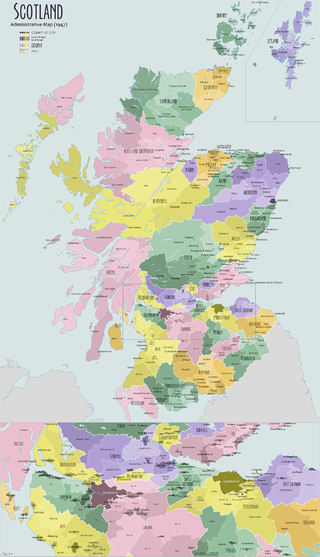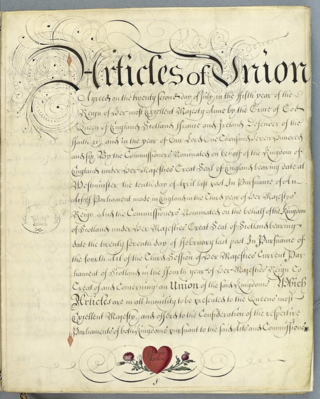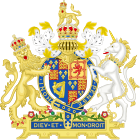
The Acts of Union were two Acts of Parliament: the Union with Scotland Act 1706 passed by the Parliament of England, and the Union with England Act 1707 passed by the Parliament of Scotland. They put into effect the terms of the Treaty of Union that had been agreed on 22 July 1706, following negotiation between commissioners representing the parliaments of the two countries. By the two Acts, the Kingdom of England and the Kingdom of Scotland—which at the time were separate states in a personal union—were, in the words of the Treaty, "United into One Kingdom by the Name of Great Britain".

The monarchy of the United Kingdom, commonly referred to as the British monarchy, is the constitutional form of government by which a hereditary sovereign reigns as the head of state of the United Kingdom, the Crown Dependencies and the British Overseas Territories. The current monarch is King Charles III, who ascended the throne on 8 September 2022, upon the death of his mother, Queen Elizabeth II.

The constitution of the United Kingdom is an uncodified constitution made up of various statutes, judicial precedents, convention, treaties and other sources. Beginning in the Middle Ages, the constitution developed gradually in response to various crises. By the 20th century, the British monarchy had become a constitutional and ceremonial monarchy, and Parliament developed into a representative body exercising parliamentary sovereignty.

The Lord Chancellor, formally titled Lord High Chancellor of Great Britain, is the highest-ranking traditional minister among the Great Officers of State in Scotland and England in the United Kingdom, nominally outranking the prime minister. The lord chancellor is appointed by the sovereign on the advice of the prime minister. Prior to the union of England and Scotland into the Kingdom of Great Britain, there were separate lord chancellors for the Kingdom of England and the Kingdom of Scotland. There were Lord Chancellors of Ireland until 1922.

The shires of Scotland, or counties of Scotland, are historic subdivisions of Scotland established in the Middle Ages and used as administrative divisions until 1975. Originally established for judicial purposes, from the 17th century they started to be used for local administration purposes as well. The areas used for judicial functions (sheriffdoms) came to diverge from the shires, which ceased to be used for local government purposes after 1975 under the Local Government (Scotland) Act 1973.

The Court of Session is the supreme civil court of Scotland and constitutes part of the College of Justice; the supreme criminal court of Scotland is the High Court of Justiciary. The Court of Session sits in Parliament House in Edinburgh and is both a trial court and a court of appeal. Decisions of the court can be appealed to the Supreme Court of the United Kingdom, with the permission of either the Inner House or the Supreme Court. The Court of Session and the local sheriff courts of Scotland have concurrent jurisdiction for all cases with a monetary value in excess of £100,000; the plaintiff is given first choice of court. However, the majority of complex, important, or high value cases are brought in the Court of Session. Cases can be remitted to the Court of Session from the sheriff courts, including the Sheriff Personal Injury Court, at the request of the presiding sheriff. Legal aid, administered by the Scottish Legal Aid Board, is available to persons with little disposable income for cases in the Court of Session.

The Kingdom of England was a sovereign state on the island of Great Britain from 12 July 927, when it emerged from various Anglo-Saxon kingdoms, until 1 May 1707, when it united with Scotland to form the Kingdom of Great Britain, and England is now part of the United Kingdom. The Kingdom of England was among the most powerful states in Europe during the medieval and early modern colonial periods.

Politics of England forms the major part of the wider politics of the United Kingdom, with England being more populous than all the other countries of the United Kingdom put together. As England is also by far the largest in terms of area and GDP, its relationship to the UK is somewhat different from that of Scotland, Wales or Northern Ireland. The English capital London is also the capital of the UK, and English is the dominant language of the UK. Dicey and Morris (p26) list the separate states in the British Islands. "England, Scotland, Northern Ireland, the Isle of Man, Jersey, Guernsey, Alderney, and Sark.... is a separate country in the sense of the conflict of laws, though not one of them is a State known to public international law." But this may be varied by statute.

Succession to the British throne is determined by descent, sex, legitimacy, and religion. Under common law, the Crown is inherited by a sovereign's children or by a childless sovereign's nearest collateral line. The Bill of Rights 1689 and the Act of Settlement 1701 restrict succession to the throne to the legitimate Protestant descendants of Sophia of Hanover who are in "communion with the Church of England". Spouses of Catholics were disqualified from 1689 until the law was amended in 2015. Protestant descendants of those excluded for being Roman Catholics are eligible.

The Parliament of Scotland was the legislature of the Kingdom of Scotland from the 13th century until 1707. The parliament evolved during the early 13th century from the king's council of bishops and earls, with the first identifiable parliament being held in 1235 during the reign of Alexander II, when it already possessed a political and judicial role.
The Lord High Commissioner to the Parliament of Scotland was the monarch of Scotland's's personal representative to the Parliament of Scotland. From the accession of James VI of Scotland to the throne of England in 1603, a Lord High Commissioner was appointed from among the senior nobility to represent the Scottish monarch in parliament when he or she was absent, as was usually the case up to 1707. The Act of Union 1707, which merged the Parliament of Scotland and the Parliament of England to create the Parliament of Great Britain, rendered the post redundant.

Demise of the Crown is the legal term in the United Kingdom and the Commonwealth realms for the transfer of the Crown upon the death or abdication of the monarch. The Crown transfers automatically to the monarch's heir. The concept evolved in the kingdom of England, and was continued in Great Britain and then the United Kingdom. The concept also became part of the constitutions of the British colonies, and was continued in the constitutions of the Commonwealth realms, until modified within those realms.

The Treaty of Union is the name usually now given to the treaty which led to the creation of the new state of Great Britain, providing that the Kingdom of England and the Kingdom of Scotland were to be "United into One Kingdom by the Name of Great Britain". At the time it was more often referred to as the Articles of Union.

The first Parliament of the Kingdom of Great Britain was established in 1707 after the merger of the Kingdom of England and the Kingdom of Scotland. It was in fact the 4th and last session of the 2nd Parliament of Queen Anne suitably renamed: no fresh elections were held in England or in Wales, and the existing members of the House of Commons of England sat as members of the new House of Commons of Great Britain. In Scotland, prior to the union coming into effect, the Scottish Parliament appointed sixteen peers and 45 Members of Parliaments to join their English counterparts at Westminster.
Events from the year 1703 in the Kingdom of Scotland.

The formation of the United Kingdom of Great Britain and Northern Ireland has involved personal and political union across Great Britain and the wider British Isles. The United Kingdom is the most recent of a number of sovereign states that have been established in Great Britain at different periods in history, in different combinations and under a variety of polities. Historian Norman Davies has counted sixteen different states over the past 2,000 years.

Scots law is the legal system of Scotland. It is a hybrid or mixed legal system containing civil law and common law elements, that traces its roots to a number of different historical sources. Together with English law and Northern Ireland law, it is one of the three legal systems of the United Kingdom.

In the United Kingdom, the Great Officers of State are traditional ministers of the Crown who either inherit their positions or are appointed to exercise certain largely ceremonial functions or to operate as members of the government. Separate Great Officers exist for England and Wales, Scotland, and formerly for Ireland, though some exist for Great Britain and the United Kingdom as a whole.

















